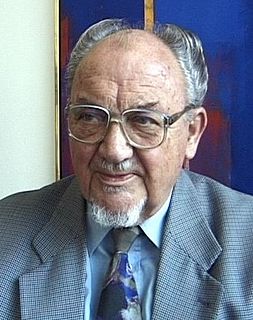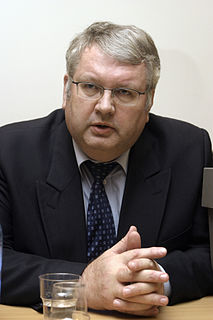The politics of the Faroe Islands a "constituent country" of the Kingdom of Denmark, function within the framework of a parliamentary representative democratic dependency, whereby the Prime Minister of the Faroe Islands is the head of government, and of a multi-party system. The Faroe Islands are politically associated with the Kingdom of Denmark, but have been self-governing since 1948. Executive power is exercised by the government. Legislative power is vested in both the government and the Løgting. The judiciary is independent of the executive and the legislature and the responsibility of Denmark. As of October 25, 2007, the Faroe Islands became one electoral district.

The Inatsisartut, also known as the Parliament of Greenland in English, is the unicameral parliament of Greenland, a autonomous country in the Danish realm. Established in 1979, it meets in Inatsisartut, on the islet of Nuuk Center in central Nuuk.
Sjálvstýri is a liberal and autonomist political party in the Faroe Islands. It is currently led by the Mayor of Klaksvík Jógvan Skorheim.

The Union Party is a conservative-liberal and agrarian political party in the Faroe Islands. The party wants to maintain the Faroe Islands union with Denmark. On 24 October 2015 Bárður á Steig Nielsen succeeded Kaj Leo Johannesen as party leader.
There are three types of elections in Denmark: elections to the national parliament, local elections and elections to the European Parliament. Referendums may also be called to consult the Danish citizenry directly on an issue of national concern.

General elections were held in Denmark on 4 December 1973 and in the Faroe Islands on 13 December. It has since been referred to as the Landslide Election, as five new or previously unrepresented parties won seats, and more than half the members of the parliament were replaced. The Social Democratic Party, which had led a minority government until this election, lost a third of their seats. After the election Poul Hartling, the leader of the liberal Venstre, formed the smallest minority government in Denmark's history with only 22 seats, supported by the Progress Party, the Conservative People's Party, the Social Liberal Party, the Centre Democrats and the Christian People's Party.

General elections were held in Denmark on 21 September 1971 and in the Faroe Islands on 5 October. The Social Democratic Party remained the largest in the Folketing, with 70 of the 179 seats. Voter turnout was 87.2% in Denmark proper, 56.8% in the Faroe Islands and 52.1% in Greenland.

The Social Democratic Party is a social-democratic political party in the Faroe Islands, led by Aksel V. Johannesen.

Anfinn Kallsberg is a Faroese politician, former prime minister, and the former leader of the People's Party. First elected to the Faroese parliament in 1980 and consecutively since then, Kallsberg served as Fisheries Minister from 1983 to 1985 and for 5 months in Jógvan Sundstein's first coalition government in 1989, and as Economics and Finance Minister from 1996 to 1998 in a coalition led by Edmund Joensen.

Folketing elections were held alongside Landsting elections in Denmark on 30 October 1945, except in the Faroe Islands where they were held on 20 November. The Social Democratic Party remained the largest in the Folketing, with 48 of the 149 seats. Voter turnout was 86.3% in Denmark proper and 57.3% in the Faroes.

Folketing elections were held in Denmark on 28 October 1947, except in the Faroe Islands where they were held on 18 February 1948. The Social Democratic Party remained the largest in the Folketing, with 57 of the 150 seats. Voter turnout was 85.8% in Denmark proper and 60.1% in the Faroes.

An independence referendum was held in the Faroe Islands on 14 September 1946.
General elections were held in the Faroe Islands on 8 November 1962. The Social Democratic Party emerged as the largest party in the Løgting, winning 8 of the 29 seats.
General elections were held in the Faroe Islands on 8 November 1966. The Social Democratic Party emerged as the largest party in the Løgting, winning 7 of the 26 seats.
General elections were held in the Faroe Islands on 10 November 1920. The Union Party and the Self-Government Party both won 10 of the 20 seats in the Løgting.
General elections were held in the Faroe Islands on 28 January 1936. The Union Party and the Self-Government Party emerged as the joint-largest parties in the Løgting, both winning 8 of the 24 seats.
General elections were held in the Faroe Islands on 30 January 1940. The Union Party emerged as the largest party in the Løgting, winning 8 of the 24 seats.

The Faroese independence movement or the Faroese national movement is a political movement which seeks the establishment of the Faroe Islands as a sovereign state outside Denmark. Reasons for complete autonomy include the linguistic and cultural divide between Denmark and the Faroe Islands as well as their lack of proximity to one another; the Faroe Islands are about 990 km from Danish shores.












